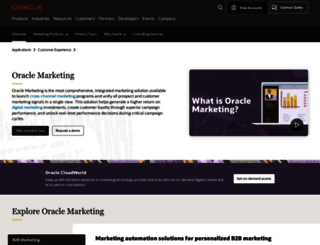Marketing Cloud | Oracle
Page Load Speed
2.1 sec in total
First Response
134 ms
Resources Loaded
1.4 sec
Page Rendered
516 ms

About Website
Welcome to eloqua.com homepage info - get ready to check Eloqua best content for United States right away, or after learning these important things about eloqua.com
Oracle CX Marketing is an integrated set of digital marketing solutions that help B2B and B2C marketers deliver personalized experiences.
Visit eloqua.comKey Findings
We analyzed Eloqua.com page load time and found that the first response time was 134 ms and then it took 1.9 sec to load all DOM resources and completely render a web page. This is quite a good result, as only 35% of websites can load faster.